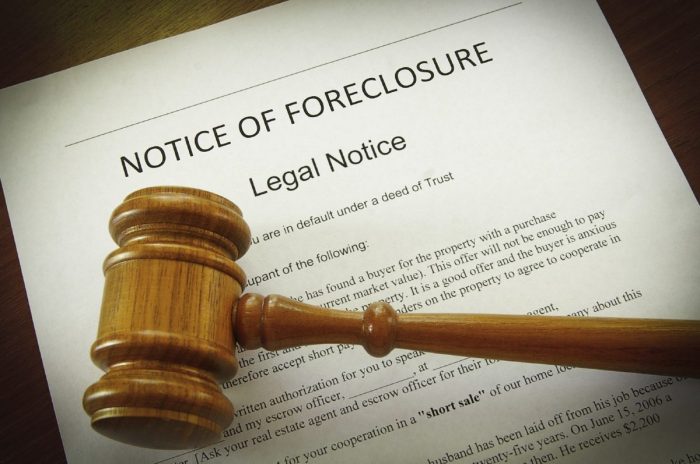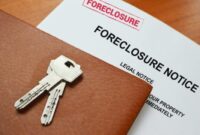Foreclosure Laws – Understanding foreclosure laws for mobile homes can be challenging, as they differ significantly from those for traditional homes. With mobile homes becoming an increasingly popular housing choice due to their affordability, it’s essential for homeowners, buyers, and even renters to know how foreclosure laws apply. In this article, we’ll delve into the current foreclosure process for mobile homes, explain the differences in foreclosure proceedings between mobile and traditional homes, and outline what homeowners need to know about foreclosure protection laws and home loan options.
Introduction to Mobile Home Foreclosure Laws
In the United States, foreclosure laws for mobile homes vary depending on state laws and how the home is classified. A mobile home can either be considered as personal property (similar to a vehicle) or as real property (similar to a house and land).
If the mobile home is considered personal property, foreclosure laws will often follow repossession processes, similar to those for a car or vehicle. However, if the home is permanently attached to land and classified as real estate, traditional foreclosure laws apply, which could mean a lengthier and more complicated process. Understanding these differences is key for mobile home buyers and homeowners.
How Mobile Home Foreclosure Laws Differ from Traditional Home Foreclosures
Classification as Personal or Real Property
The first step in determining the type of foreclosure law that applies to a mobile home is to check how the home is legally classified. Mobile homes that are not attached permanently to land are usually considered personal property and can be foreclosed in a much faster, often less costly process.
However, if a mobile home is placed on a foundation and permanently affixed to the land (and the homeowner owns that land), the home may be classified as real property. In these cases, foreclosure laws for traditional homes may apply, providing the homeowner with more protections, such as longer timelines and potential state-mandated foreclosure alternatives.
Loan Types and Foreclosure Processes
Mobile home loans differ significantly from mortgages for traditional homes. Loans for mobile homes classified as personal property are often issued by different lenders than those for traditional real estate, with potentially higher interest rates and shorter terms. As a result, loan default and foreclosure rates for mobile homes can be more frequent. For mobile homeowners, understanding the specifics of their loan terms is crucial to navigate foreclosure protection options effectively.
Foreclosure Process for Mobile Homes
Step 1: Defaulting on Payments
When a mobile homeowner falls behind on payments, the lender will send a notice of default. This marks the start of the foreclosure process. It’s essential to understand whether this notice is sent according to state foreclosure laws or if it follows repossession procedures, as it impacts the homeowner’s rights and the timeline for foreclosure.
Step 2: Classification and Type of Foreclosure
Once the default notice is issued, the foreclosure process depends on the classification of the mobile home:
- For Personal Property: If the mobile home is personal property, lenders may proceed with repossession. In this case, a lender might be able to repossess the mobile home quickly, sometimes within a month or two, depending on the state’s foreclosure laws.
- For Real Property: If classified as real property, the lender must follow a judicial foreclosure process, which may include court hearings. This can extend the foreclosure process by several months, giving the homeowner more time to consider options such as loan modifications or short sales.
Step 3: Sale and Auction
In the final stage of foreclosure, the mobile home may be sold at an auction. For those classified as real property, the foreclosure sale will generally be conducted similarly to that of a traditional home. If the mobile home is considered personal property, however, the sale process may be quicker and could happen in a private sale rather than a public auction.
Foreclosure Timeline and State Variations
Each state has its own foreclosure timeline and rules for how lenders must proceed. For instance, California foreclosure laws mandate a 90-day waiting period from the notice of default, providing homeowners time to either catch up on payments or pursue foreclosure prevention options. Understanding local foreclosure laws is essential for those looking to keep their homes or at least extend the foreclosure timeline.
Foreclosure Protection Options for Mobile Homeowners
Facing foreclosure is challenging, but mobile homeowners have several protection options. Here’s a breakdown of some of the most common foreclosure protections:
Forbearance Programs
Many lenders offer forbearance programs, which temporarily reduce or pause monthly payments, providing financial relief. For mobile homeowners, forbearance programs can offer a crucial window of time to recover financially and avoid foreclosure.
Loan Modification
A loan modification is a long-term solution, allowing the homeowner to alter the terms of their mortgage or loan. Common changes include extending the loan term, lowering interest rates, or rolling overdue payments into the balance.
Government Foreclosure Assistance Programs
Federal programs, like those offered by the Federal Housing Administration (FHA), can be beneficial for mobile homeowners. The FHA’s Home Affordable Modification Program (HAMP) has offered support to struggling homeowners, and while the program has evolved, similar state and federal programs continue to be available.
For more detailed information on government foreclosure assistance programs, check out the Department of Housing and Urban Development’s (HUD) website.
Refinancing
For homeowners with higher interest rates or adjustable-rate mortgages, refinancing can be a strategic option. By refinancing, homeowners might secure a lower interest rate or more favorable loan terms, potentially reducing monthly payments and avoiding foreclosure.
Considerations for Buyers and Sellers of Mobile HomesUnderstanding Loan Terms and Conditions
Before purchasing a mobile home, buyers must understand the specific loan requirements, whether they’re acquiring a traditional mortgage or a mobile home loan. Loan specifics, such as interest rates, loan-to-value ratios, and repayment terms, play a significant role in foreclosure risks and homeowner protections.
Importance of Location and Property Classification
Buyers should also consider whether the mobile home will be placed on rented land or if they will own the land outright. Renting land makes the mobile home more susceptible to repossession if payments are missed, as the home remains classified as personal property. Owning the land and permanently placing the mobile home on a foundation could afford homeowners more protections under real estate foreclosure laws.
Resale Value and Market Trends
Mobile homes typically have lower resale values than traditional homes. Sellers and buyers should be aware of the current housing market trends and how they impact mobile homes, especially during economic downturns. In some cases, high interest rates and low resale values can lead to increased foreclosure rates in mobile home communities.
Insurance and Maintenance Costs
Insurance and maintenance play a significant role in mobile home ownership. Unlike traditional homes, mobile homes often face unique maintenance issues and may require specialized insurance coverage, impacting overall affordability and increasing foreclosure risks for some buyers.
Conclusion
Understanding the nuances of foreclosure laws for mobile homes is essential for anyone in the mobile home market. Whether you are a buyer, a homeowner, or even considering selling, knowing how foreclosure processes work, the types of loan options available, and what foreclosure protection laws exist can empower you to make informed decisions. Although mobile homes offer affordability, they also come with unique legal considerations, so staying educated on state and federal protections is key. If facing foreclosure, exploring forbearance programs, loan modifications, and government assistance can offer critical support.
For a comprehensive guide on mobile homeownership, be sure to explore additional resources on the Department of Housing and Urban Development’s (HUD) website.




